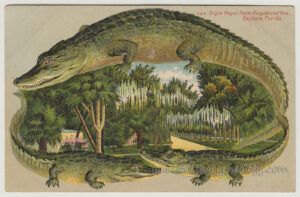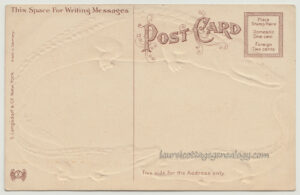Divided back, unused, embossed postcard. Publisher: S. Langsdorf & Co., New York. Made in Germany. Series 618. Circa 1908 – 1914.
Price: $35.00
This is what’s called an “alligator border” postcard. They were very collectible at the time and are pretty highly valued today. You can find them selling for around 30.00 or 40.00 dollars to in the hundreds, depending on content and rarity….And, imagine this particular card having been placed in an album after it was first purchased, because if you look closely (enlarge the image twice) you’ll notice the slightly darker coloration on each corner (so that when it was displayed in the album you were not seeing the corners). I like this kind of “physical proof” – it seems to add another layer or dimension to the card.
When looking for publisher S. Langsdorf, we found mention of him and (bonus!) the alligator border phenom in this Google book search: America’s Alligator: A Popular History of Our Most Celebrated Reptile, by Doug Alderson. You can also take a “Look Inside” for part of the book on Amazon.com right now. See the upcoming post for more on S. Langsdorf.
The “Triple” in Royal Palm is, I think, a description of a Royal Palm that has three trunks, or maybe multiple trunks, as in the most predominant palm appearing in our postcard above.
Sources: Alderson, Doug. America’s Alligator: A Popular History of Our Most Celebrated Reptile. Rowman and Littlefield, 2020. (books.google.com).
Royal Palm Tree. https://www.allaboutpalmtrees.com/royal-palm-tree (accessed October 22, 2022).


